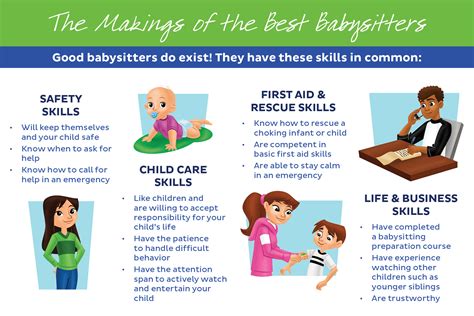As a babysitter, you play a vital role in ensuring the safety, well-being, and happiness of young children. Your skills and responsibilities extend far beyond simply watching over kids; they encompass a range of essential tasks that require a blend of patience, responsibility, and experience.

Essential Babysitting Skills
1. Childcare Techniques
- Feeding: Prepare meals, snacks, and feed children according to their dietary needs and preferences.
- Diapering and Toileting: Change diapers, assist with potty training, and maintain children’s hygiene.
- Bathing: Supervise and assist children during bath time, ensuring their safety and comfort.
- First Aid and Safety: React promptly to minor injuries, administer basic first aid, and follow safety protocols.
2. Discipline and Behavior Management
- Positive Reinforcement: Encourage positive behavior through praise, rewards, and support.
- Redirection: Guide children away from inappropriate or unsafe behaviors into more constructive activities.
- Time-Outs: Use time-outs as a consequence for serious misbehavior, providing children with space to calm down and reflect.
- Communication: Communicate with children openly, setting clear expectations and boundaries while respecting their feelings.
3. Play and Recreation
- Age-Appropriate Activities: Engage children in age-appropriate games, crafts, and activities that stimulate their development and creativity.
- Supervised Play: Ensure children’s safety while encouraging them to explore their surroundings and engage in imaginative play.
- Outdoor Fun: Take children outside for fresh air and exercise, supervising their activities and ensuring their well-being.
4. Emergency Preparedness
- First Response: Know how to respond to common emergencies, such as falls, cuts, and choking.
- Medical Information: Keep medical information about the children readily available, including contact information for their parents.
- Fire Safety: Be familiar with fire safety procedures and know how to safely evacuate children in case of an emergency.
5. Communication and Reporting
- Regular Updates: Provide parents with regular updates on the children’s activities, behavior, and any significant events.
- Accuracy and Honesty: Be truthful about your observations and report any incidents or concerns to parents promptly.
- Confidentiality: Maintain the privacy of the children and their family, respecting their personal information.
6. Other Essential Skills
- Driving License: Have a valid driver’s license and be comfortable transporting children in a safe and responsible manner.
- CPR and First Aid Certification: Consider obtaining CPR and first aid certification to enhance your emergency response capabilities.
- Reliable and Trustworthy: Be a responsible and reliable person who can be trusted with the well-being of children.
- Patience and Flexibility: Have the patience to deal with challenging situations and be flexible in adapting to changing circumstances.
The Importance of Babysitting Skills
According to the National Association for the Education of Young Children (NAEYC), trained and experienced babysitters play a crucial role in children’s development and well-being. They provide:
- Safe and Nurturing Environment: Babysitters create a safe and nurturing environment where children feel comfortable and cared for.
- Cognitive and Social Skills: Through play and interaction, babysitters help children develop cognitive and social skills, such as language, problem-solving, and empathy.
- Parent Support: Babysitters provide parents with peace of mind and support, knowing that their children are safe and well-cared for.
Additional Concepts for Skilled Babysitting
1. Innovation in Babysitting
- Virtual Babysitting: Use video conferencing to provide remote babysitting services, allowing parents to monitor their children from afar.
- Multi-Child Care: Specialize in providing childcare for multiple children simultaneously, managing their needs and activities efficiently.
- Event-Based Babysitting: Offer babysitting services for special events, such as weddings and parties, ensuring that children are supervised and entertained.
2. Building Strong Relationships
- Communicate Effectively: Establish clear communication channels with parents to stay informed about the children’s needs and preferences.
- Empathize with Children: Show empathy and understanding towards children, creating a positive and supportive relationship.
- Respect Family Values: Respect the family’s values and parenting style, fostering a cooperative and harmonious environment.
3. Professional Development
- Attend Workshops and Trainings: Regularly attend workshops and trainings to enhance your babysitting skills and stay up-to-date with industry best practices.
- Network with Other Babysitters: Connect with other babysitters to share tips, experiences, and support.
- Pursue Higher Education: Consider pursuing a degree or certification in early childhood education to further your professional development and career opportunities.
Conclusion
Babysitting is more than just a job; it is a valuable service that requires a range of essential skills and responsibilities. By honing your childcare techniques, mastering discipline and behavior management, engaging children in play and recreation, preparing for emergencies, and communicating effectively, you can become a skilled and trusted caregiver who ensures the well-being and happiness of young children. Remember, your role as a babysitter extends beyond supervising children; it involves nurturing their development, creating a safe and loving environment, and supporting parents in their parenting journey.
